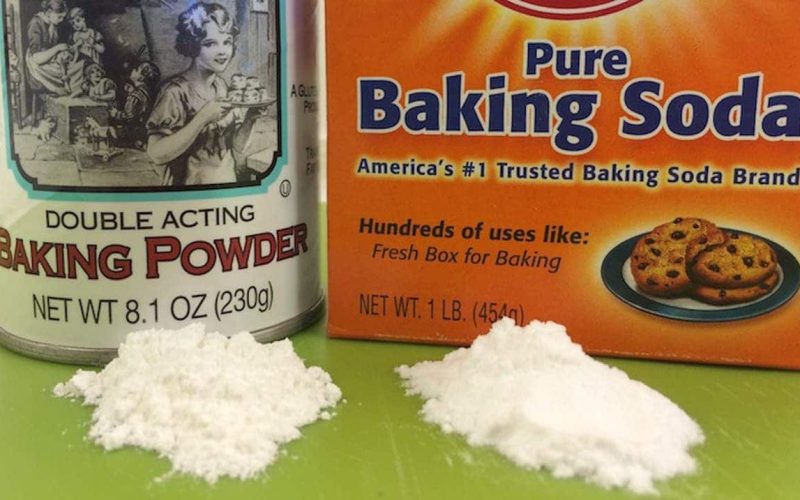Baking powder and baking soda are leavening or rising specialists. They help baked goods rise. Because of their comparable names and appearances, experienced and beginner pastry chefs regularly confuse them for each other.
This article clarifies the difference between baking powder and baking soda and how exchanging one for the other may influence your baked products.
What is Baking Powder?
Baking powder adds sodium bicarbonate, different bicarbonates, and corrosive salts.
Baking powder is a raising agent that combines an acid response with a base-reacting one. It consists of an acidic ingredient.
These acid-preparing ingredients are tartrate, phosphate, and sodium aluminum sulfate, utilized alone or in a mix.
Baking powders comprise bases, acids, and some buffering materials, which help prevent early acid-base responses.
However, the baking powders sold economically contain baking soda or sodium bicarbonate alongside one another or numerous salts that deliver acidic reactions when broken down in solvents.
Homemade baking powder is an indispensable part of numerous recipes since it helps raise and enhance volume. Moreover, you can utilize a wide range of choices.
Validity Period
Baking powder is consistently easy to eat, but it loses strength as an agent over time. An unopened jar of baking powder can last as long as a year and a half.
An opened compartment of baking powder ought to be replaced every three to six months. However, this depends on how much it was exposed to air and how sticky it is.
Since baking powder consists of an acid and a base, it is receptive to dampness when baking soda.
What is Baking Soda?
Firstly, baking soda is a base. Do you recall the science analysis we did in school? We blended baking soda with vinegar and watched an ejection of air pockets.
Typically, we did this in some model volcano contraption. You get a compound reaction by combining baking soda (BASE) with vinegar (ACID). A result of this reaction is carbon dioxide.
A similar accurate reaction occurs in our treats, cakes, and bread. When a baking recipe calls for baking soda (BASE), it ordinarily requires some acids.
These acids are buttermilk, earthy-colored sugar, yogurt, lemon juice, vinegar, banana bread, cream of tartar, molasses, fruit purée, ordinary cocoa powder (not Dutch cycle), or honey.
You need this acid in the formula to react with the baking soda, forming carbon dioxide and permitting your baked food to rise.
Baking soda is solid. It is also around 3-4x more grounded than baking powder. More baking soda in a formula doesn’t mean more lift.
You need to utilize just enough to respond to the measure of corrosive in the recipe.
The formula contains extra baking soda and insufficient caustic methods. You don’t need that; it makes your baked foods taste metallic and foamy.
Validity Period
Baking soda is usable for an unlimited time, which implies that it’s consistently safe to eat. Nonetheless, baking soda loses its viability over the long haul.
An unopened leftover baking soda holder will stay vital for a long time, while an opened compartment should be replaced regularly.
Difference Between Baking Powder and Baking Soda
| Baking Soda | Baking Powder |
|---|---|
| Has just a single fixing – Sodium Bicarbonate | It consists of numerous fixings including Bicarbonates and acid salts |
| It doesn’t contain Monocalcium Phosphate | Contains Monocalcium Phosphate, which responds with NaHCO3 when wetted and warmed |
| Reacts promptly with acids | It doesn’t quickly react when exposed to acids |
| Short raising process | The raising interaction stretched out with the assistance of an acid |
| Baking items formed when baking soda is utilized are not fluffy | It gives fluffier items from baking |
Replacing Baking Powder with Baking Soda
Even though subbing baking powder and soda isn’t generally recommended, you might try to make it work when there’s no other option.
Trading baking powder with baking soda will not require extra fixings.
Notwithstanding, baking soda is a lot more grounded than powder. Subsequently, you probably need around three times the powder used in baking soda to make a similar rising capacity.
Furthermore, this replacement may make your result taste harsh.
Replacing Baking Soda with Baking Powder
If your formula calls for baking powder and all you have within reach is baking soda, you might have no choice but to substitute. However, it would help if you incorporated extra fixings.
Since baking soda is inadequate regarding the acid that baking powder would ordinarily add to the formula, you need to add an acidic fixing, like cream of tartar, to actuate the baking soda.
Furthermore, baking soda has a much more grounded raising force than baking powder.
Conclusion
Many baked recipes incorporate baking soda or baking powder as a raising agent. Some may even combine both. While the two items seem comparative, they’re unquestionably not the same.
Baking soda is sodium bicarbonate, which requires acid and fluid to get enacted and help prepared merchandise rise. Alternately, baking powder incorporates sodium bicarbonate and acid.
It’s anything but liquid to get actuated. Subbing one for the other is possible with cautious changes.







